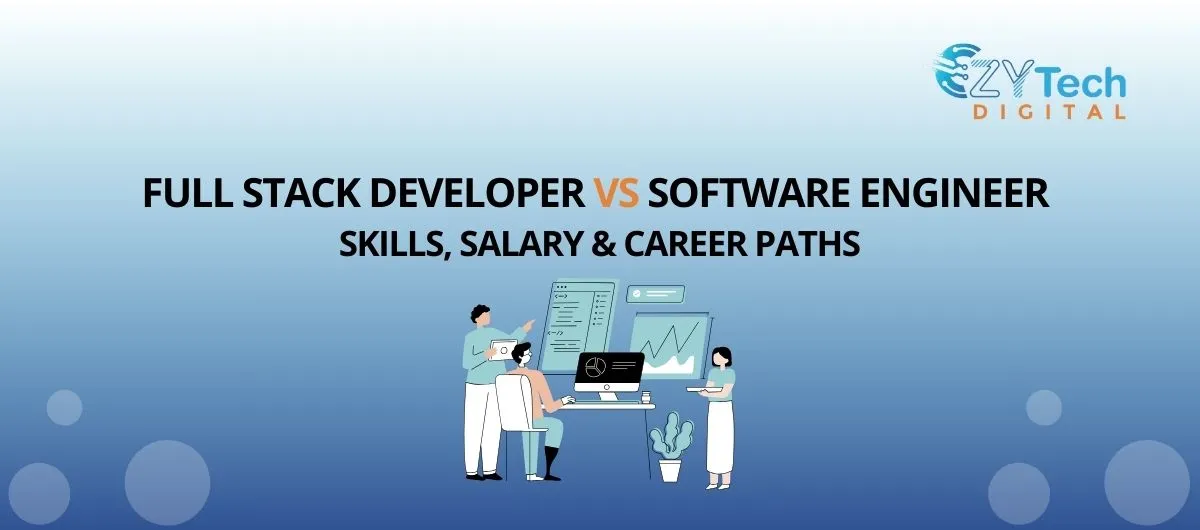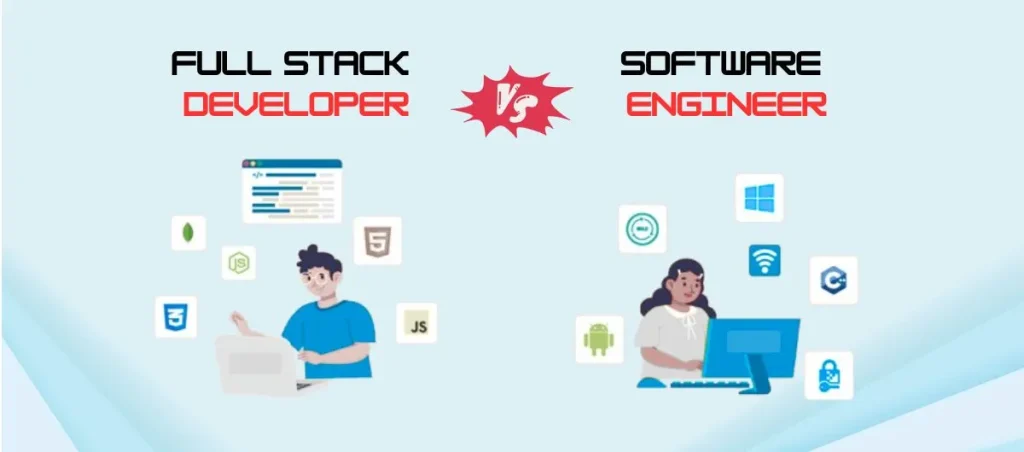
When I first started looking into tech careers, I kept seeing two job titles: Full Stack Developer vs Software Engineer. At first, they seemed pretty similar, but after some research, I realized they have distinct roles, responsibilities, and career paths.
If you’re trying to decide between these two career options, this guide will help you understand the differences, the skills required, salary expectations, and which path might be the best fit for you.
What is a Full Stack Developer?
A Full Stack Developer is a software professional who works on both the front-end (user interface) and back-end (server, database, and logic) of a web application. In other words, they handle everything needed to build and run a functional website or app.
Responsibilities of a Full Stack Developer
- Designing and building user-friendly web interfaces (HTML, CSS, JavaScript, React, Angular)
- Developing back-end logic and APIs (Node.js, Django, Flask, Express.js)
- Managing databases (SQL, MongoDB, Firebase)
- Deploying applications to cloud platforms (AWS, Google Cloud, Heroku)
- Debugging and optimizing performance
- Collaborating with designers, engineers, and project managers
Why Companies Hire Full-Stack Developers
Startups and smaller teams love Full Stack Developers because they can work on both front-end and back-end, making them cost-effective and versatile. Instead of hiring multiple specialists, a single-stack developer can handle an entire project from start to finish.
Example: Imagine a startup that wants to build a mobile-friendly e-commerce site. A Full Stack Developer can design the website, set up the shopping cart functionality, connect it to a payment system, and deploy it—all without needing a separate front-end and back-end team.
What is a Software Engineer?
A Software Engineer is a professional who applies engineering principles to design, develop, test, and maintain complex software systems. Unlike Full Stack Developers, Software Engineers focus on a specific aspect of software development, such as backend infrastructure, cloud computing, or AI.
Responsibilities of a Software Engineer
- Designing software architecture and system logic
- Writing efficient, scalable, and secure code
- Developing complex algorithms and data structures
- Building and optimizing large-scale applications
- Testing, debugging, and improving software performance
- Working on specialized areas like machine learning, cybersecurity, or cloud computing
Why Companies Hire Software Engineers
Large companies like Google, Microsoft, and Amazon rely on Software Engineers to build highly scalable, secure, and efficient systems. These professionals often specialize in a particular area of software development and work in teams focused on long-term projects.
Example: Think of Netflix’s recommendation system. The engineers behind it don’t worry about front-end design; instead, they focus on machine learning models, database performance, and cloud infrastructure to improve recommendations for millions of users.
Key Differences: Full Stack Developer vs. Software Engineer

| Feature | Full Stack Developer | Software Engineer |
| Scope of Work | Front-end & Back-end | Specialized in one area |
| Typical Projects | Web apps, small business sites | Large-scale systems, AI, databases |
| Required Skills | JavaScript, React, Node.js, SQL | Java, Python, C++, cloud computing |
| Work Environment | Startups, freelance, mid-sized companies | Tech giants, research, enterprise apps |
| Salary Potential | $90,000 – $130,000 | $120,000 – $180,000 |
Key Takeaways
- Full Stack Developers are generalists who work on both front-end and back-end. Ideal for web development, startups, and freelancing.
- Software Engineers are specialists who focus on scalable systems, AI, and backend infrastructure. Best suited for big tech companies and research roles.
Salary Comparison
According to Glassdoor, LinkedIn, and the Bureau of Labor Statistics (BLS), here’s a salary breakdown for both roles in the U.S.:
| Experience Level | Full Stack Developer Salary | Software Engineer Salary |
| Entry-Level (<1 Year) | $90,000 – $100,000 | $120,000 – $135,000 |
| Mid-Level (5+ Years) | $110,000 – $130,000 | $140,000 – $170,000 |
| Senior-Level (15+ Years) | $160,000 – $180,000 | $200,000 – $250,000 |
Software engineers generally earn more because they work on large-scale, high-impact projects requiring deeper expertise.
How to Become a Full Stack Developer vs. Software Engineer
Education & Learning Paths
Full Stack Developers – Can learn through coding boot camps, online courses, or a Computer Science degree. Platforms like freeCodeCamp, Udemy, Coursera, and Harvard CS50 are great starting points.
Software Engineers – Typically hold a Bachelor’s or Master’s in Computer Science, Software Engineering, or AI. Specialized fields like cloud computing and machine learning often require formal education and certifications (AWS, Google Cloud, Microsoft Azure).
Essential Skills
Programming Languages: Python, JavaScript, Java, C++, Ruby
Front-End: HTML, CSS, React, Angular
Back-End: Node.js, Django, Flask
Databases: SQL, MongoDB, PostgreSQL
Cloud Computing: AWS, Docker, Kubernetes
Soft Skills: Problem-solving, teamwork, adaptability
Conclusion: Which Path is Right for You?
Choosing between Full Stack Development and Software Engineering depends on your interests and career goals:
Pick Full Stack Development if you love variety, enjoy building complete applications, and want to work in startups or freelance.
Pick Software Engineering if you prefer solving deep technical problems, want to specialize in an area like AI or cloud computing, and aim to work at a big tech company.
Regardless of your choice, both careers offer fantastic job prospects, high salaries, and growth opportunities. The key is to keep learning, build projects, and stay updated with industry trends.
READ MORE: Software Engineering Consultant
Frequently Asked Questions (FAQs)
A Full Stack Developer is proficient in both front-end and back-end development, handling everything from user interfaces to server logic. In contrast, a Software Engineer applies engineering principles to design, develop, and maintain software systems, often specializing in specific areas like backend infrastructure or cloud computing.
Yes, a Full Stack Developer is a type of Software Engineer with expertise across the entire stack of technologies used in a project, encompassing both client-side and server-side development.
Full Stack Developers are often seen as more versatile due to their ability to work on both front-end and back-end aspects of applications. However, Software Engineers may specialize deeply in particular areas, offering in-depth expertise.
Salaries can vary based on experience, location, and specific skill sets. Generally, Software Engineers, especially those with specialized skills, may command higher salaries compared to Full Stack Developers.
A Full Stack Developer should be proficient in multiple programming languages (e.g., JavaScript, Python), understand front-end technologies (HTML, CSS, JavaScript frameworks), back-end technologies (Node.js, Django), databases (SQL, MongoDB), and version control systems.
